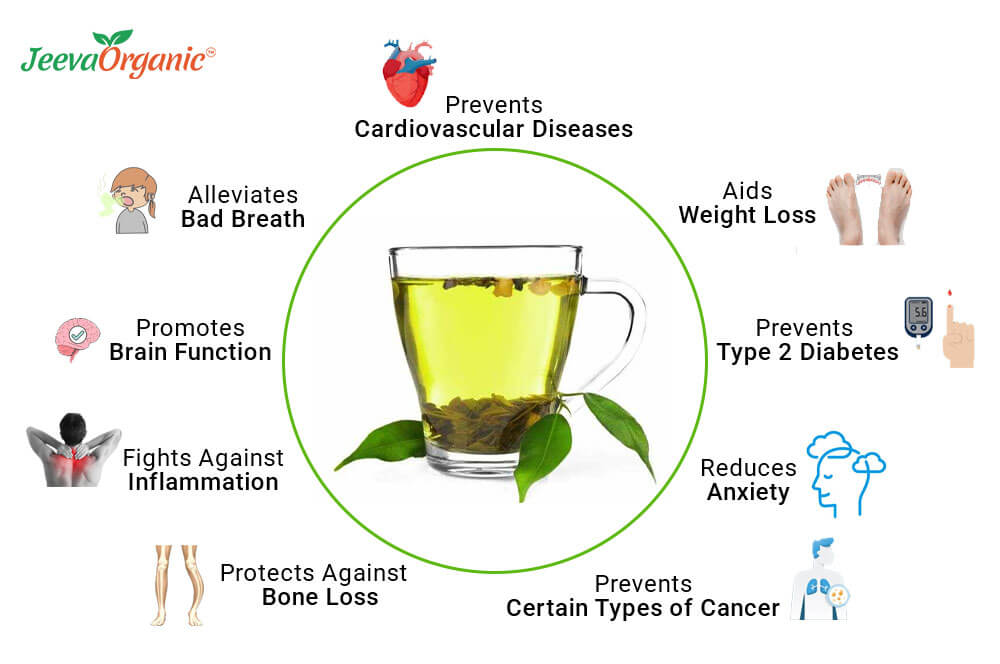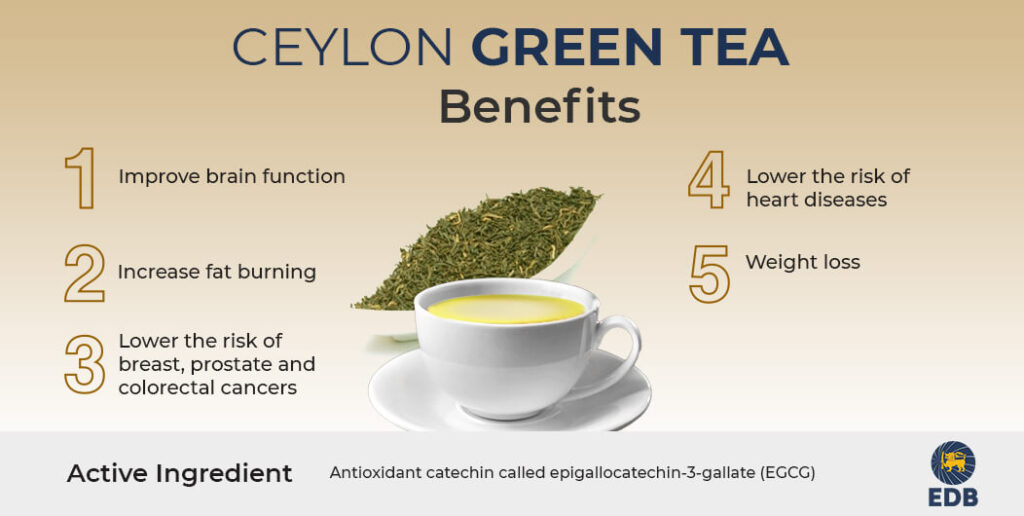Benefits of Green Tea
Green tea has long been celebrated for its numerous health benefits, and one variation that is gaining popularity is fruit green tea. With its refreshing and vibrant flavors, fruit green tea combines the antioxidant-rich properties of green tea with the natural goodness of fruits. Packed with vitamins and minerals, this delightful beverage not only promotes hydration but also aids in detoxifying the body and boosting the immune system. In this article, we explore the many benefits of fruit green tea and how it can contribute to our overall well-being. So, grab a cup and let us journey into the world of fruit green tea together!

This image is property of draxe.com.
Health Benefits
Green tea is not only a popular beverage, but it also provides numerous health benefits that contribute to our overall well-being. From its rich antioxidant content to its ability to support weight loss and improve brain function, green tea is a versatile drink that can positively impact our health in many ways.
Rich in antioxidants
One of the key health benefits of green tea is its high antioxidant content. Antioxidants help protect our cells from damage caused by harmful molecules called free radicals. The antioxidants found in green tea, such as catechins, can help combat oxidative stress and reduce the risk of chronic diseases.
Boosts metabolism
Green tea has been shown to boost our metabolism, which can be beneficial for weight management. The catechins in green tea are believed to help increase fat oxidation and improve insulin activity, leading to a higher metabolic rate and potentially aiding in weight loss.
Supports weight loss
In addition to boosting metabolism, green tea has properties that can directly support weight loss. Studies have shown that green tea can help reduce abdominal fat and suppress appetite, making it a helpful addition to a healthy diet and exercise routine for those aiming to shed pounds.
Improves brain function
The beneficial compounds in green tea, such as caffeine and L-theanine, have been found to enhance brain function. Caffeine can improve alertness and focus, while L-theanine promotes relaxation and reduces anxiety. This combination can lead to improved cognitive performance, memory, and attention.
Lowers the risk of heart disease
Heart disease is a leading cause of morbidity and mortality globally. However, regular consumption of green tea has been linked to a reduced risk of heart disease. Green tea can help lower LDL cholesterol levels and reduce triglyceride levels, two important markers of heart health. Moreover, it has been shown to inhibit blood clot formation and enhance blood vessel function, further contributing to a healthier heart.
Reduces the risk of certain cancers
Cancer is a devastating disease, but adding green tea to our daily routine may help reduce the risk of certain types of cancer. Research suggests that the antioxidants and polyphenols in green tea can protect against breast cancer, prostate cancer, lung cancer, and colorectal cancer, among others. The compounds in green tea may help inhibit the growth of cancer cells and prevent tumor formation.
Strengthens the immune system
Green tea has immune-boosting properties that can help strengthen our body’s defense mechanisms. It can increase the production of infection-fighting cells and enhance overall immune function. Regular consumption of green tea may help prevent bacterial and viral infections, keeping us healthier and reducing the duration and severity of illnesses.
Promotes anti-aging effects
As we age, our skin naturally undergoes changes, and signs of aging become more apparent. Green tea contains substances that can help protect against skin aging and promote a youthful appearance. The antioxidants in green tea can reduce wrinkles and fine lines, improve skin elasticity, and enhance overall complexion, giving us a healthier and more youthful glow.
Enhances dental health
Healthy teeth and gums are essential for our overall well-being. Green tea has several properties that can contribute to better dental health. It fights the bacteria causing tooth decay, reduces plaque formation, and prevents gum disease. Regular consumption of green tea may also help reduce bad breath, promoting better oral hygiene.
Helps in managing diabetes
For individuals with diabetes or those at risk of developing the condition, green tea can be a helpful addition to their management plan. Green tea can regulate blood sugar levels, enhance insulin sensitivity, and reduce the risk of type 2 diabetes. Additionally, it may alleviate diabetes-related complications by its antioxidant and anti-inflammatory properties.
Nutritional Value
Apart from its health benefits, green tea also offers nutritional value. It contains essential vitamins, minerals, and beneficial compounds that contribute to its overall health-promoting properties.
Vitamins and minerals
Green tea contains various vitamins, including vitamin C, vitamin E, and B vitamins such as folate. These vitamins contribute to our overall health and support various bodily functions. Additionally, green tea is a good source of minerals like manganese, potassium, and magnesium, which are essential for maintaining optimal health.
Catechins and polyphenols
Green tea is abundant in catechins and polyphenols, which are powerful antioxidants. Catechins, such as epigallocatechin gallate (EGCG), are known for their potent health benefits. These compounds can help fight free radicals, reduce inflammation, and protect against chronic diseases.
Amino acids
Green tea contains certain amino acids, including L-theanine. L-theanine is known for its calming effects, promoting relaxation and reducing stress. This amino acid is unique to tea and contributes to the overall experience and benefits of drinking green tea.
Caffeine and theanine content
Green tea naturally contains caffeine, although in smaller amounts compared to coffee. The combination of caffeine and L-theanine in green tea provides a balanced boost of energy without the jitters or crashes often associated with coffee consumption. Theanine also helps counteract the potential side effects of caffeine, promoting a sense of calmness and focus.
Flavonoids and antioxidants
Flavonoids, a type of plant compound, are found in abundance in green tea. These flavonoids, along with the antioxidants present in green tea, provide a myriad of health benefits. Flavonoids have been shown to have anti-inflammatory, anti-cancer, and cardiovascular-protective effects, contributing to the overall positive impact of green tea on our health.
Calorie content
Green tea is a low-calorie beverage, making it a suitable option for those watching their calorie intake. It is an excellent alternative to sugary drinks or high-calorie beverages, providing hydration and health benefits without adding excessive calories to our diet.
Weight Loss and Metabolism
Green tea has long been associated with weight loss and improved metabolism. The combination of its natural compounds can contribute to more efficient fat burning and enhanced physical performance.
Increases fat oxidation
Green tea has been found to increase fat oxidation, the process by which the body breaks down fat for energy. The catechins in green tea can help stimulate the breakdown of stored fat and increase the rate at which fat is used as fuel, leading to a higher calorie expenditure and potential weight loss.
Boosts metabolic rate
Green tea consumption has been shown to boost the metabolic rate by increasing thermogenesis, the process through which the body generates heat and burns calories. The catechins and caffeine in green tea can stimulate this process, helping our bodies burn more calories even at rest.
Enhances physical performance
The combination of caffeine and L-theanine in green tea can enhance physical performance. Caffeine acts as a stimulant, improving endurance, focus, and power during physical activities. Meanwhile, L-theanine promotes a state of relaxation and reduces perceived exertion, allowing for better performance.
Reduces abdominal fat
One of the most challenging areas to lose fat is the abdominal region. However, green tea consumption has been linked to a reduction in abdominal fat. The combination of increased fat oxidation, improved metabolism, and appetite suppression makes green tea a potential ally in achieving a flatter stomach and reducing waist circumference.
Suppresses appetite
Controlling our appetite plays a crucial role in weight management. Green tea has appetite-suppressing properties, mainly attributed to the presence of catechins and caffeine. These compounds can help reduce hunger and cravings, making it easier to stick to a healthy eating plan and prevent overeating.
Regulates blood sugar levels
Maintaining stable blood sugar levels is essential for weight management and overall health, especially for individuals with diabetes or insulin resistance. Green tea has been shown to regulate blood sugar levels, preventing rapid spikes and dips that can lead to cravings and overeating. This feature of green tea can contribute to better weight management and diabetes control.
Heart Health
Maintaining a healthy heart is vital for our overall well-being, and green tea has properties that can support cardiovascular health.
Lowers LDL cholesterol levels
High levels of LDL (low-density lipoprotein) cholesterol, often referred to as “bad” cholesterol, are a significant risk factor for heart disease. Regular consumption of green tea has been found to lower LDL cholesterol levels, reducing the risk of plaque buildup in the arteries and the development of cardiovascular diseases.
Reduces triglyceride levels
Elevated triglyceride levels in the blood are also associated with an increased risk of heart disease. Green tea has been shown to reduce triglyceride levels, leading to a more favorable lipid profile and improved heart health.
Inhibits blood clot formation
Blood clot formation can lead to severe complications, such as heart attacks and strokes. The catechins in green tea have anti-thrombotic properties, meaning they can help inhibit abnormal blood clot formation and reduce the risk of blood clot-related conditions.
Enhances blood vessel function
The health of our blood vessels is crucial for optimal heart function. Green tea has been found to improve blood vessel function by enhancing endothelial function, which plays a key role in maintaining healthy blood pressure and blood flow. By supporting blood vessel health, green tea contributes to overall cardiovascular well-being.

This image is property of bulksale.jeevaorganic.com.
Cancer Prevention
Cancer prevention is a significant concern, and the consumption of green tea has been associated with a reduced risk of certain types of cancer.
Protects against breast cancer
Breast cancer is one of the most common cancers diagnosed in women worldwide. The antioxidants and polyphenols in green tea have been found to offer protection against breast cancer. Studies suggest that regular consumption of green tea may help inhibit cancer cell growth and reduce the risk of developing breast cancer.
Reduces the risk of prostate cancer
For men, prostate cancer is a prevalent form of cancer. Green tea consumption has been linked to a reduced risk of prostate cancer. The compounds in green tea can help suppress the growth of prostate cancer cells and promote their death, potentially offering a protective effect against this disease.
Inhibits the growth of lung cancer cells
Lung cancer is a leading cause of cancer-related deaths worldwide. While quitting smoking remains the most effective preventive measure, green tea consumption may also have a protective role. Studies have shown that the compounds in green tea can inhibit the growth of lung cancer cells and potentially reduce the risk of developing this deadly disease.
Prevents colorectal cancer
Colorectal cancer affects the colon and rectum and is one of the most common cancers globally. Green tea has been found to possess anti-cancer properties that can help prevent colorectal cancer. Regular consumption of green tea can inhibit the growth of cancer cells in the colon and rectum, potentially reducing the risk of this type of cancer.
May aid in preventing liver cancer
Liver cancer is a significant global health concern, often associated with chronic liver diseases, such as hepatitis B or C. Green tea consumption has shown promising results in protecting against liver cancer. The antioxidants in green tea can help suppress the growth of liver cancer cells and mitigate the risk of developing this aggressive cancer.
Brain Function and Mental Health
The benefits of green tea extend beyond the physical realm. Green tea can positively impact brain function and contribute to better mental health.
Improves cognitive function
Cognitive function encompasses various mental processes such as memory, attention, and problem-solving. Green tea, with its combination of caffeine and L-theanine, has been found to improve cognitive function. The synergistic effects of these compounds can enhance alertness, focus, and mental agility.
Enhances memory and attention
Memory and attention are vital components of cognitive function. Green tea consumption has been associated with improved memory and attention span. The caffeine in green tea acts as a stimulant, boosting brain activity, while the L-theanine promotes a state of relaxation and calmness, creating an optimal environment for improved cognitive performance.
Reduces the risk of neurodegenerative diseases
Neurodegenerative diseases, such as Alzheimer’s and Parkinson’s, affect millions of people worldwide. Green tea’s powerful antioxidants and neuroprotective properties have been linked to a reduced risk of these diseases. Regular consumption of green tea may help protect brain cells from damage and delay the onset of age-related cognitive decline.
Relieves stress and anxiety
Stress and anxiety have become prevalent in modern-day life, and finding natural ways to alleviate these conditions is essential. Green tea, particularly the amino acid L-theanine, has calming effects on the brain. L-theanine promotes relaxation and reduces stress and anxiety, helping us achieve a more balanced and calm state of mind.
Improves mood and promotes relaxation
Green tea’s combination of caffeine and L-theanine can contribute to improved mood and a sense of relaxation. The caffeine provides an energizing effect, while the L-theanine counteracts potential side effects like jitters, promoting a state of calmness and well-being. Consuming green tea can be a pleasant ritual that enhances our mood and promotes relaxation.

This image is property of wellcurve.in.
Immune System Support
A robust immune system is crucial for staying healthy and fighting off infections. Green tea contains compounds that can strengthen our immune response and enhance overall immune function.
Boosts immune response
Green tea has immune-boosting properties that can help increase our body’s defense against pathogens. The antioxidants and catechins in green tea can enhance immune cell activity, promoting a more robust immune response to invading bacteria or viruses.
Increases production of infection-fighting cells
Regular consumption of green tea has been shown to increase the production of infection-fighting cells. These cells, such as natural killer cells and lymphocytes, play a crucial role in defending the body against infections and diseases.
Enhances overall immune function
The compounds found in green tea, including polyphenols and catechins, can enhance overall immune function. By reducing oxidative stress and inflammation, green tea supports a more balanced immune response, ensuring its optimal functioning.
Prevents bacterial and viral infections
Green tea’s antimicrobial properties can help prevent bacterial and viral infections. The catechins in green tea have been found to inhibit the growth and activity of harmful bacteria and viruses, reducing the risk of infections and promoting a healthier immune system.
Anti-Aging Effects
Aging is a natural process that affects our bodies, but green tea may help slow down some of the visible signs of aging, particularly on our skin.
Protects against skin aging
The antioxidants in green tea can help protect against skin aging. These antioxidants work to neutralize free radicals that can damage skin cells, promoting a more youthful and radiant complexion.
Reduces wrinkles and fine lines
Wrinkles and fine lines are common signs of aging, but green tea’s anti-aging properties may help reduce their appearance. The compounds in green tea can support collagen production, improve skin elasticity, and reduce the formation of wrinkles and fine lines.
Improves skin elasticity
Green tea’s antioxidant content can improve skin elasticity, making it appear firmer and more toned. This enhanced elasticity can help reduce sagging and the formation of wrinkles over time, contributing to a more youthful appearance.
Promotes a healthy complexion
Drinking green tea regularly can result in a healthier complexion. The antioxidants and anti-inflammatory properties of green tea can reduce skin redness, soothe irritations, and promote a clearer and more even skin tone. As a result, the skin looks brighter and more youthful.

This image is property of www.srilankabusiness.com.
Dental Health
Maintaining good dental health is essential for overall well-being, and green tea can contribute to a healthier mouth and teeth.
Fights bacteria causing tooth decay
Catechins and polyphenols found in green tea have antimicrobial properties that help fight the bacteria causing tooth decay. Regular consumption of green tea can help prevent cavities and protect against oral bacteria that contribute to dental problems.
Reduces plaque formation
Plaque formation on teeth is a common dental issue that can lead to cavities and gum disease. Green tea can help reduce plaque formation due to its antibacterial properties, promoting better oral hygiene and minimizing the risk of dental problems.
Prevents gum disease
Gum disease, characterized by inflammation and infection of the gums, can lead to tooth loss if left untreated. Green tea’s antimicrobial and anti-inflammatory properties can help prevent gum disease by reducing inflammation, fighting oral bacteria, and promoting healthier gums.
Reduces bad breath
Bad breath, or halitosis, can be embarrassing and uncomfortable. Green tea’s antimicrobial properties can help reduce the bacteria that cause bad breath, providing a natural and refreshing solution for maintaining fresh breath throughout the day.
Diabetes Management
For individuals with diabetes or those at risk of developing the condition, green tea can be a valuable addition to their management plan.
Regulates blood sugar levels
Green tea has been found to regulate blood sugar levels, making it a suitable choice for individuals with diabetes. The compounds in green tea can help improve insulin activity and modulate glucose metabolism, leading to more stable blood sugar levels.
Enhances insulin sensitivity
Insulin sensitivity refers to how effectively our cells respond to insulin, the hormone that regulates blood sugar levels. Green tea consumption has been associated with improved insulin sensitivity, potentially aiding in better diabetes management and prevention of complications.
Reduces the risk of type 2 diabetes
Regular consumption of green tea has been linked to a reduced risk of type 2 diabetes. The antioxidants and polyphenols in green tea can help protect against insulin resistance and lower the risk of developing this prevalent form of diabetes.
Alleviates diabetes-related complications
Individuals with diabetes are at risk of developing various complications due to prolonged high blood sugar levels. Green tea’s antioxidant and anti-inflammatory properties can help alleviate these complications by reducing oxidative stress, inflammation, and tissue damage associated with diabetes.
In conclusion, green tea is more than just a flavorful beverage. Its numerous health benefits, ranging from its antioxidant content to its potential to support weight loss, make it a valuable addition to a healthy lifestyle. By incorporating green tea into our daily routine, we can reap the rewards of improved brain function, a healthier heart, reduced risk of certain cancers, and enhanced immune system support. With its positive effects on dental health and potential to aid in managing diabetes, green tea truly stands out as a powerful natural ally for our overall well-being. So why not sip on a cup of green tea and enjoy its friendly health benefits today?




